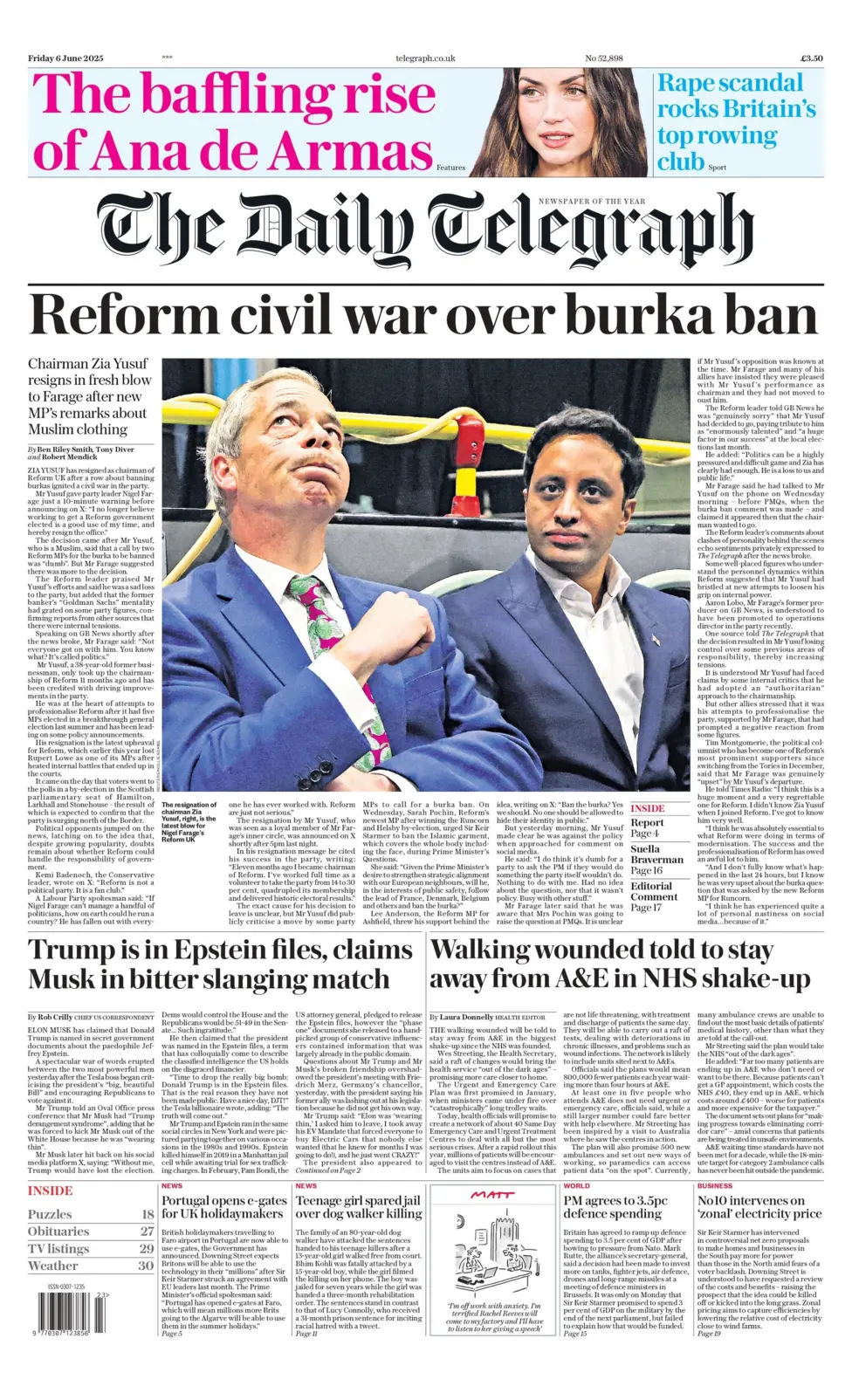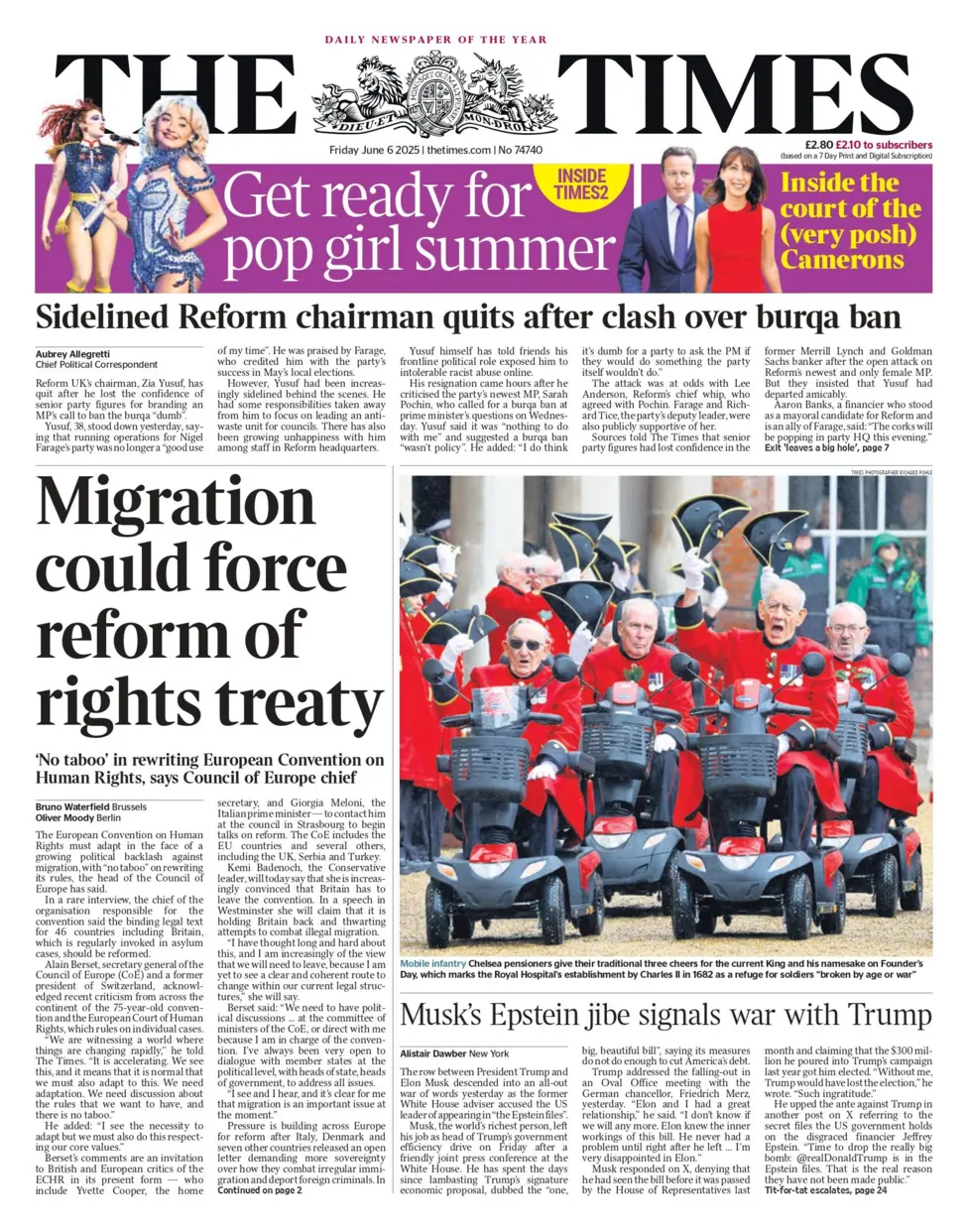- Iranian cargo ship bound for Russia sinks in the Caspian Sea
- Ten British far-right activists barred from France for migrant harassment
- Waitress in helmet with sparklers among 40 casualties in Swiss bar fire
- UK Government Mulls X Block due to Grok AI Image Concerns
- Wingsuit pilot dies after 1,000ft mountain dive at 120mph
- US Forces Boldly Capture Russian-Flagged Oil Tanker Marinera in Atlantic
- US Spy Planes Gathering at RAF Bases in the UK
- UK Faces Heavy Snowfall as Storm Goretti Hits: What to Expect
‘Reform civil war over Burka ban’ | Paper Talk UK
Bias Exposure
Several UK newspaper front pages cover the departure from Reform UK for the party chairman Zia Yusuf. The reports that a Reform civil war has broken out over a potential Burka ban, have deepened divisions within the party and led to several high-profile departures. It’s been a difficult time for Reform, internally, with questions over leadership, conflict and internal divisions swirling.
Yusuf kept his departure statement short and swift: “11 months ago I became chairman of Reform. I’ve worked full-time as a volunteer to take the party from 14 to 30%, quadrupled its membership and delivered historic electoral results.
“I no longer believe working to get a Reform government elected is a good use of my time, and hereby resign the office.”
The Telegraph reports Zia Yusuf has resigned as chairman of Reform UK after a row about banning burkas ignited a new civil war in the party.
Mr Yusuf gave party leader Nigel Farage just 10 minutes warning before announcing on X: “I no longer believe working to get a Reform government elected is a good use of my time, and hereby resign the office.”
The decision – announced hours before the polls closed in a crucial by-election – came after Mr Yusuf, who is a Muslim, said that a call by two Reform MPs for the burka to be banned was “dumb”.
EXPLAINER
This headline uses conflict framing (“civil war”) to dramatise internal party tensions, suggesting deep division within Reform UK. The subheadline adds personalisation and consequence—Zia Yusuf’s resignation is described as a “fresh blow” to Farage, reinforcing a narrative of instability and backlash over cultural or religious insensitivity, particularly around Islam.

The Financial Times say Reform UK chair Zia Yusuf has resigned from Nigel Farage’s populist party after criticising comments by one of its MPs about burkas, saying that he no longer believes the role is a “good use of my time”.
Although Reform has climbed in the polls and swept last month’s local elections, several of its senior figures have left, and observers question whether party leader Nigel Farage can hold together a team to present as a potential government at the next general election.
EXPLAINER
This headline uses succinct language to maximise impact. “Yusuf exits” implies a significant departure, while “Reform blow” frames it as a major setback for the party. The structure personalises the issue and reinforces a narrative of turmoil or internal strife within Reform UK.

The Guardian says Zia Yusuf has resigned as the chair of Reform UK after suggesting it was “dumb” of the party’s newest MP to ask the prime minister if he would ban the burqa.
Yusuf, a donor and businessman, said he was resigning after less than a year in the job because he did not believe working to get a Reform government elected was a good use of his time.
His departure is a blow to Nigel Farage as he tries to professionalise his rapidly growing party, with political rivals saying it shows the Reform leader cannot work with other senior figures without falling out.
EXPLAINER
This headline uses authority framing by focusing on the “chair” quitting, signalling high-level dissent. The phrase “in blow to Farage” personalises the fallout, portraying the resignation as a direct challenge to his leadership and reinforcing a narrative of party instability or controversy.

The Times says few figures in Reform UK were more evangelical about the prospects of Nigel Farage as a future prime minister than Zia Yusuf. “Not only will Nigel become prime minister, he will become prime minister with hundreds of MPs who are under no uncertain terms as to why they’re being elected,” the chairman of Reform UK said last year.
That unswerving faith in Farage came to an abrupt end last night after Yusuf found himself embroiled in the latest in a series of brutal internal party rows.
On Wednesday Sarah Pochin, Reform’s newest MP, called for a burka ban in her first intervention at prime minister’s questions.
EXPLAINER
This headline uses power struggle framing (“sidelined”, “clash”) to highlight internal discord. The phrase “showed him ‘clearly who is boss’” implies authoritarian leadership from Farage, reinforcing a narrative of control and marginalisation. It also ties the dispute to a divisive cultural issue (the burka ban), adding a layer of identity politics and controversy.

Subscribe to Updates
Get the latest creative news from FooBar about art, design and business.

